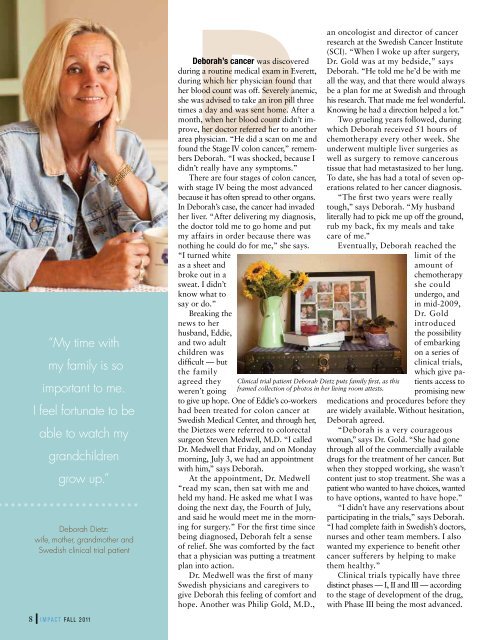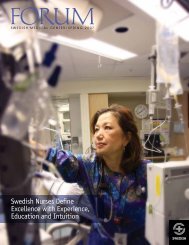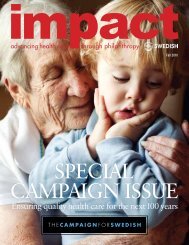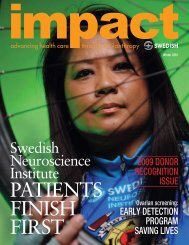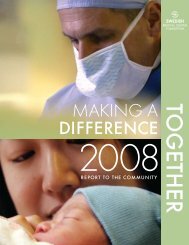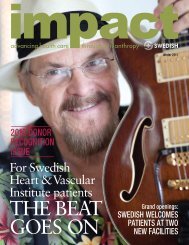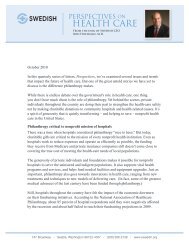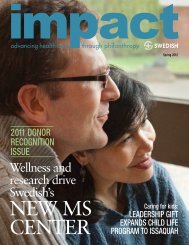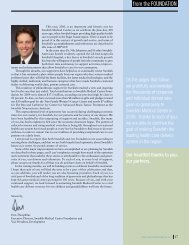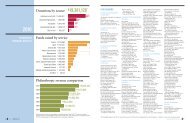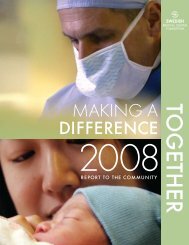Fall Edition - Swedish Medical Center Foundation
Fall Edition - Swedish Medical Center Foundation
Fall Edition - Swedish Medical Center Foundation
- No tags were found...
You also want an ePaper? Increase the reach of your titles
YUMPU automatically turns print PDFs into web optimized ePapers that Google loves.
“My time withmy family is soimportant to me.I feel fortunate to beable to watch mygrandchildrengrow up.”Deborah Dietz:wife, mother, grandmother and<strong>Swedish</strong> clinical trial patientDDeborah’s cancer was discoveredduring a routine medical exam in Everett,during which her physician found thather blood count was off. Severely anemic,she was advised to take an iron pill threetimes a day and was sent home. After amonth, when her blood count didn’t improve,her doctor referred her to anotherarea physician. “He did a scan on me andfound the Stage IV colon cancer,” remembersDeborah. “I was shocked, because Ididn’t really have any symptoms.”There are four stages of colon cancer,with stage IV being the most advancedbecause it has often spread to other organs.In Deborah’s case, the cancer had invadedher liver. “After delivering my diagnosis,the doctor told me to go home and putmy affairs in order because there wasnothing he could do for me,” she says.“I turned whiteas a sheet andbroke out in asweat. I didn’tknow what tosay or do.”Breaking thenews to herhusband, Eddie,and two adultchildren wasdifficult — butthe familyagreed theyweren’t goingto give up hope. One of Eddie’s co-workershad been treated for colon cancer at<strong>Swedish</strong> <strong>Medical</strong> <strong>Center</strong>, and through her,the Dietzes were referred to colorectalsurgeon Steven Medwell, M.D. “I calledDr. Medwell that Friday, and on Mondaymorning, July 3, we had an appointmentwith him,” says Deborah.At the appointment, Dr. Medwell“read my scan, then sat with me andheld my hand. He asked me what I wasdoing the next day, the Fourth of July,and said he would meet me in the morningfor surgery.” For the first time sincebeing diagnosed, Deborah felt a senseof relief. She was comforted by the factthat a physician was putting a treatmentplan into action.Dr. Medwell was the first of many<strong>Swedish</strong> physicians and caregivers togive Deborah this feeling of comfort andhope. Another was Philip Gold, M.D.,an oncologist and director of cancerresearch at the <strong>Swedish</strong> Cancer Institute(SCI). “When I woke up after surgery,Dr. Gold was at my bedside,” saysDeborah. “He told me he’d be with meall the way, and that there would alwaysbe a plan for me at <strong>Swedish</strong> and throughhis research. That made me feel wonderful.Knowing he had a direction helped a lot.”Two grueling years followed, duringwhich Deborah received 51 hours ofchemotherapy every other week. Sheunderwent multiple liver surgeries aswell as surgery to remove canceroustissue that had metastasized to her lung.To date, she has had a total of seven operationsrelated to her cancer diagnosis.“The first two years were reallytough,” says Deborah. “My husbandliterally had to pick me up off the ground,rub my back, fix my meals and takecare of me.”Eventually, Deborah reached thelimit of theamount ofchemotherapyshe couldundergo, andin mid-2009,Dr. Goldintroducedthe possibilityof embarkingon a series ofclinical trials,which give patientsaccess topromising newmedications and procedures before theyare widely available. Without hesitation,Deborah agreed.“Deborah is a very courageouswoman,” says Dr. Gold. “She had gonethrough all of the commercially availabledrugs for the treatment of her cancer. Butwhen they stopped working, she wasn’tcontent just to stop treatment. She was apatient who wanted to have choices, wantedto have options, wanted to have hope.”“I didn’t have any reservations aboutparticipating in the trials,” says Deborah.“I had complete faith in <strong>Swedish</strong>’s doctors,nurses and other team members. I alsowanted my experience to benefit othercancer sufferers by helping to makethem healthy.”Clinical trials typically have threedistinct phases — I, II and III — accordingto the stage of development of the drug,with Phase III being the most advanced.Clinical trial patient Deborah Dietz puts family first, as thisframed collection of photos in her living room attests.In October 2009, Deborah participatedin Phase II research, which “workedgreat,” she says. “It helped me feelsteadier.” The following February,she began taking a Phase III drug, “whichworked even better.” And this past April2011, Deborah became the first personin the United States to be enrolled ina new Phase I study, with promisingresults. Within the first few weeks oftreatment, her level of a tumor markercalled CEA had dropped from 35 to amuch-more-normal 5.“The clinical trials — the third onein particular — changed my life,” saysDeborah. “The things that I do havegotten so much easier. I still have symptoms,but very few compared to before.”On a typical day, Deborah, a formerassistant daycare director, might go for awalk with her husband, work in the yard,or play with her four grandchildren. Herfamily loves RVing on both sides of themountains and spending time at the beach,and her son is planning a wedding. Deborahis currently learning how to play golf.“My time with my family is so importantto me,” says Deborah. “I feel fortunateto be able to see my grandchildren grow up.”She adds, “Without <strong>Swedish</strong>’s cancerresearch program, I wouldn’t be heretoday. Dr. Gold is my hero.”“I just want to do the best I can forDeborah and have her be around with herfamily for as long as possible,” says Dr.Gold. “I want to keep giving her thosechoices and that hope. Patients like tohave options. Patients want to have hope.And clinical research gives them both.”Cancer research at <strong>Swedish</strong>The history of clinical cancer researchat <strong>Swedish</strong> — research that has significantlyimproved the lives of DeborahDietz and thousands of other patientssuffering from cancer — dates back fourdecades. In the early 1970s, Seattle-nativeSaul Rivkin, M.D. became <strong>Swedish</strong>’ssecond medical oncologist and wasinstrumental in early efforts to establishthe medical center’s cancer institute asa national leader. In addition to writinginnovative protocols, including onecreated in 1974 that is still being usedtoday, he initiated <strong>Swedish</strong>’s participationin the Southwest Oncology Group(SWOG), one of the largest NationalCancer Institute-supported cooperativegroups for cancer clinical trials in theUnited States. <strong>Swedish</strong> has acted as theMake an impactFEATURESince its founding in the 1970s, <strong>Swedish</strong> Cancer Institute’s researchdivision has grown steadily, making <strong>Swedish</strong> one of the leading clinicaltrial sites in the western United States. Over the years, treatments, devicesand technologies developed and used by <strong>Swedish</strong> investigators inclinical research have greatly contributed to making <strong>Swedish</strong> a placewhere patients and their families know they will be able to receivethe most advanced cancer care available in their own community.Patients have always come first at <strong>Swedish</strong>, and the <strong>Swedish</strong> Cancer ResearchDivision operates under two guiding principles:Giving cancer patients more choices for treatment. Most cancers are extremelycomplicated diseases that can affect patients in many different ways. The broadprogram of clinical cancer research conducted at the <strong>Swedish</strong> allows our caregiversto choose from an array of devices, therapies and technologies. These caninclude both standard practices and, when standard treatments aren’t available,investigative approaches. For each patient, the issues involved in deciding whichtreatments to choose are carefully explained, and the goal is always to providepatients who have been diagnosed with cancer the best treatment and outcomespossible.Bringing science to the bedside. At <strong>Swedish</strong>, treating cancer means diagnosingat the earliest stage possible, and quickly identifying the best ways to treat andrestore health. Patients who choose to enroll in a clinical trial or receive aninvestigational treatment for their cancer remain under the direct care of theirpersonal physicians. This focus on maintaining <strong>Swedish</strong>-style, patient-centeredcare for those participating in clinical investigations is a hallmark of the <strong>Swedish</strong>Cancer Institute.Philanthropic partnerships are integral in allowing <strong>Swedish</strong> to have an activeand dynamic cancer research program. Generous individual and corporate donorsgive our physicians opportunities to develop their understandings of cancer, toshare their knowledge with others, to participate in a stimulating, internationalscientific effort and, most of all, to be able to give their patients the kind of carethey deserve and need.Your generosity truly makes a difference in the fight against cancer. If youwould like to learn more about how you can support <strong>Swedish</strong>’s cancer researchprogram through an outright gift, a pledge, or a legacy gift, please contact EllenKuo, director, major gifts, at ellen.kuo@swedish.org or (206) 386-6928.8 IMPACT FALL 2011 www.swedishfoundation.org 9


